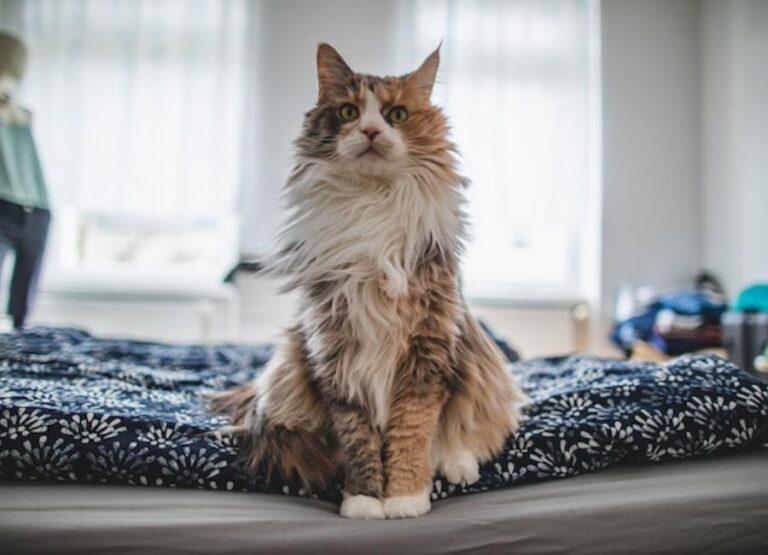Why Do Cats Run Away: 15 Reasons & Helpful Tips

Cats are popular pets that love their owners unconditionally when treated properly, but why do cats run away from home? Let’s find out together!
In this post, we will outline and discuss all the possible and common reasons why cats may decide to run away from home when the owners are not looking.
We will also outline some common ways to keep your cat from running away from home when you’re not looking.
Before we get into details, let me quickly answer your question why do cats run away in a single paragraph, after which we break it down.
Why Do Cats Run Away
Cats run away because their natural impulses (hunting) are not allowed to be expressed, they are agitated, anxious, dissatisfied, bored, lack mental stimulation, they have been ignored by their owners, or they are poorly cared for.
When a cat starts to feel the want to roam, it’s important to consider its health and safety before letting them out.
They may be searching for an escape route, such as a window or ledge from which they may jump.
Many cat owners find it difficult to comprehend why their cat escapes when given the chance.
You can help your cat stay happy and healthy by exercising patience, understanding, and providing fresh toys or a scratching post.
Let’s now outline and discuss some common reasons why cats run away from home. Here are some common reasons why cats run away:
1. Cats run away for territorial issues
Even if you have a large and spacious house, your cat will look for new places to explore, especially if they have free access to the outdoors.
The scent glands of most felines are used to distinguish their area from their own.
This includes your house, yard, neighboring streets, and maybe your entire neighborhood.
If your cat is confident, it’s possible that once they’ve created a comfortable area, they’ll want to expand it even further.
If your cat is wary, a more powerful neighbor cat may chase them out of their own yard and living space.
A cat may run away if the cat has a bigger animal crossing its territory, thereby causing the cat to live in fear or anxiety in its home.
2. Cats run away from stress
One of the most common causes for indoor cats to flee their homes is stress, and they may or may not return.
When their house gets cloudy or too noisy, or when the neighborhood becomes unsettling, indoor cats flee.
To safeguard your cat from a busy neighborhood or a noisy setting, always establish a cool and tranquil atmosphere for them.
Too much stress can cause a cat to develop unwanted behaviors and can also lead to a cat running away from home due to stress.
3. Cats run away for reproductive purposes
Male cats flee their owners for a number of reasons, none of which are incompatible or questionable.
If a male cat is not properly managed, he might go a considerable distance in search of a female cat, keeping him away from his owner.
When a male cat reaches a particular age, he develops a sexual desire that must be regulated; otherwise, your male cat may flee his house and never return.
If a male cat escapes with a female cat into the woods, it will become a wild cat if not tracked down and rescued.
4. Cats run away due to hunting instincts
The natural and deeply entrenched hunting habit of cats is another important reason why your cat is prone to stray away from home.
Are you aware that your male cat can chase a mouse up to 20 meters from your house?
Don’t rule out the potential that your male cat will become imprisoned and never return home if he continues to chase the mouse.
Because cats are natural hunters with good hunting instincts and the ability to survive in the wild, you may expect to see your male cat showing hunting behavior from time to time, especially if you live near the woods or bush.
5. Cats run away when they want to give birth
If your cat went missing when she was in heat but returned after a few days, she’s probably pregnant.
You would think that solving your running-away problem would be enough, but many cats also flee when it’s time to give birth.
Expectant cats will seek a calm, isolated, safe spot to give birth, and if you have a busy household they will run away.
As her due date approaches, she’ll become more focused on locating the ideal delivery place. If that requires you to leave your home, then they will leave.
6. Cats run away due to lack of proper care
If you let your cat roam from one setting to the next like a stray cat, why won’t he flee? Before the end of the day, your cat must have had two or more fights with other cats.
Do you think your cat would escape if a cat lover a few blocks away felt more at ease feeding and even playing with him?
If you constantly harass or beat them, one day, the day before you return home, they will be long gone.
If you don’t mind your hangover, telling your cat to try a different setting is straightforward.
If you allow your cat too much freedom, they will wander far away from home; if you abuse your cat, they will flee; if you show less concern, they will flee.
Build a fence around your cat and don’t allow it to go around the block or the neighborhood; this will make them feel unsafe near your home.
Instead of punishing your cat for making a mistake, take your time and correct them when they do.
Also, refrain from shouting at your male cat; this will make him feel unwanted and undesired in your home.
Allowing your cat to go where they want and return when they want limits the amount of freedom you provide them.
7. Cats Run Away Seeking Better Environment
Your male cat may leave if he spots you making plans or relocating if you relocate to a different city.
Even if you relocate to a new city, your male cat may run if the environment is unfriendly to cats.
If you do not provide adequate care for your female cat and her kittens, she may escape in search of a more suitable environment.
Provide your male cat with a comfortable cat-like environment; if your environment is not cat-friendly, your cat will not stay with you for long.
Assume that while you’re not looking, your neighbor’s kids are throwing stones at your cat.
If you create this environment, your cant will most likely escape and never return.
New family members can make the complex noisy or attack or pursue your cat, causing your male cat to run but come home from time to time if one of them is out.
Introducing a new animal to your cat may make them feel anxious, causing them to escape to a different location.
8. Cats run away in search of more food
Food is one of the key causes of female or male cats fleeing their homes. Let’s use female cats as an example.
A female cat needs sustenance to maintain her kittens healthy and fit once she is pregnant or has given birth.
Female cats require food to satisfy the nutritional needs of their kittens.
Don’t rule out the possibility that if you don’t feed them or provide a method to care for them and their offspring, they’ll be long gone with their kittens seeking food when you return home one day.
When female cats have kittens or are pregnant, they require additional attention, and feeding them is a major factor if you want to keep them around.
9. Cats run away when they are scared
When your cat is scared, one of its strongest impulses is to flee from whatever is frightening them, regardless of where they go to.
If anything in your house frightens your cat and there’s an open door or window nearby, your cat will most likely flee.
This is particularly perilous if the object that startled them can also chase them.
Many outdoor cats have been chased away by a dog belonging to a neighbor, and the pursuit might send them fleeing pretty far from home.
10. Cats run away due to curiosity
It’s only normal for your cat to desire to explore the outside world if they’re allowed to do so.
The more your cat’s curiosity leads them, the more risks they may face running away from home.
So, while you may believe your cat has run away from home, they might be trapped someplace.
Most outdoor cats, after all, go on regular outings and encounter things we could never fathom.
Even in a secure community, there are tight places your cat can find intriguing to walk through, such as a fence or tubes, and end up being stuck.
Some cats are bold enough to climb a tree, but not so brave when it comes time to come down.
11. Cats run away when they are sick or injured
Sickness is another natural cause of cats fleeing.
When cats are sick, they want to go somewhere remote, hidden, and quiet where they may rest and recover without being disturbed.
They may also determine that the best calm location for them is not on your property.
Hopefully, your kitty will recover quickly and return home soon. But this isn’t always the case.
Sick or wounded cats are especially vulnerable when left alone in the wild.
They might contract feline flu or become an easy target for a local predator, for example.
If your cat is on the edge of passing away, it may go out in search of solitude and never return.
12. Cats run away while hiding from death treat
When cats are threatened, they hide until the threat is passed and sometimes they run away from home.
It’s possible that if your cat goes missing, they’re hiding nearby.
If your cat moved further away from home and came into a hazard, he may have hidden and remained hidden for a while before returning home.
If your cat is still within 300 feet of your house, there are a variety of cat tracking gadgets available that can alert you to their whereabouts.
Even better, if your cat is truly hiding at home you’ll have spared yourself hours or even days of anguish!
13. Cats run away from home due to changes in daily routine
Changing your cat’s routine on a regular basis might make them unhappy and despondent, causing them to flee.
Stick to a regular activity that works for you and your cat and don’t alter it every day.
14. Cats run away due to new family member
Cats are not fond of this sort of setup when there are new members, whether they be other cats, dogs, or pets.
Even if you are anticipating a visitor, make sure your cat is prepared since they might flee and never return.
For any cat, new family members can be stressful, especially if the cat has not been properly socialized with other humans or dogs.
Poor or ineffective socialization and training might lead an indoor cat to flee; ensure that your cat is socialized with all possible fear sources.
Make sure your cat is socialized with people, dogs, cats, and other animals to avoid them running away from home.
How to stop a cat from running away
Here are some typical measures that will assist you in preventing cats from fleeing the house:
- Make sure they have a fascinating atmosphere to work in.
- Take your cat for a stroll and engage in some playtime with them.
- Provide a window or ledge for your cat.
- Keep an eye on your cat at all times.
- Make that your cat is in good health.
- Keep your kitty occupied.
- Your cat should be spayed or neutered.
- Maintain the cleanliness of your cat’s litter box.
- To keep your cat engaged, provide him with a range of activities.
- Maintain a schedule for your cat on a daily basis.
- Every now and again, add new features to your house.
- Get your cat some interactive and interesting toys.
- Create a cat-proof environment in your home.
Here are some common reasons why cats disappear without a trace. And some other ways to prevent it.
What to do if your cat runs away
Here is the list of common things you should do if your cat runs away from home:
- Look for any probable hiding spots for cats.
- Speak with the animal control officials in your area.
- Inquire around your area.
- Speak with local animal rescue groups.
- Make fliers and posters with images of your pet and distribute them across your neighborhood.
- Make contact with local animal shelters.
- Post on local social media platforms if possible.
- Publicize your business in local publications.
- Check with all of the area veterinarians.
- Consult with a pet detective.
With the information provided on this page, I strongly hope your question about why do cats run away was answered to your understanding!






